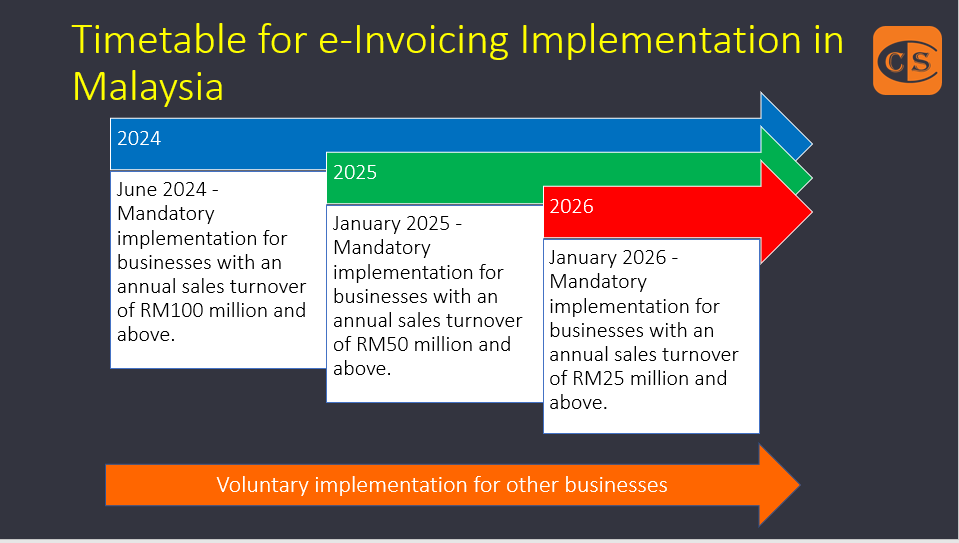
New Straits Times
The Inland Revenue Board of Malaysia plans to introduce e-invoicing in 2024.
This move aims to increase efficiency in tax collection and reduce the risk of tax evasion.
Starting in June 2024, the e-invoicing system will be mandatory for companies with an annual sales turnover of RM100 million and above [Voluntary implementation for other businesses].
From January 2025, it will be mandatory for companies with an annual sales turnover of RM50 million and above.
From January 2026, it will be mandatory for companies with an annual sales turnover of RM25 million and above.
Finally, from January 2027, it will be mandatory for all companies to adopt the e-invoicing system.
Here is a summary of the timetable for e-invoicing implementation in Malaysia:

What is e-invoicing?
It is important to note that e-invoicing differs from sending invoices as PDFs via email or other commonly used methods.
E-invoicing. or Electronic Invoicing, refers to a digital process that enables the automated exchange of invoice data between a vendor and a customer’s accounting system.
Instead of sending invoices via email or other traditional methods, the information is transmitted through a third-party network, which the government or tax authority may administer.
This invoicing method reduces the potential for errors and fraud.
Malaysia is not the first country to implement
Many countries around the world are implementing e-invoicing for tax purposes.
Some examples include:
- Singapore: Singapore has implemented a voluntary e-invoicing system, with plans to make it mandatory.
- India: India introduced mandatory e-invoicing for certain businesses in 2020 and plans to expand it to all businesses shortly.
These are just a few examples, as e-invoicing for tax purposes is becoming increasingly popular worldwide.
What are the likely challenges for Malaysian businesses?
Technological readiness: Some companies may need more technological infrastructure or expertise to implement and maintain an e-invoicing system.
Interoperability: E-invoicing systems must be compatible and interoperable with various accounting and financial systems used by different companies.
Cost: Implementation and maintenance costs associated with e-invoicing systems may be a significant barrier for small and medium-sized enterprises.
Security and privacy concerns: E-invoicing systems may be vulnerable to security breaches, which could compromise sensitive financial and personal information.
Compliance: Companies must comply with regulatory requirements related to e-invoicing, which may be complex and time-consuming.
Malaysia to Adopt E-Invoicing to Improve Tax Collection Efficiency and Reduce Fraud Risk
Disclaimer:
The articles, templates, and other materials on our website are provided only for your reference.
While we strive to ensure that the information presented is current and accurate, we cannot guarantee the completeness, reliability, suitability, or availability of the website or its content, including any related graphics. Consequently, any reliance on this information is entirely at your own risk.
If you intend to use the content of our videos and publications as a reference, we recommend that you take the following steps:
- Verify that the information provided is current, accurate, and complete.
- Seek additional professional opinions, as the scope and extent of each issue, may be unique.
免责声明:
我们网站上的文章、模板和其他材料只供参考。
虽然我们努力确保所提供的信息是最新和准确的,但我们不能保证网站或其内容,包括任何相关图形的完整性、可靠性、适用性或可用性。因此,您需要承担使用这些信息所带来的风险。
如果你打算使用我们的视频和出版物的内容作为参考,我们建议你采取以下步骤:
- 核实所提供的信息是最新的、准确的和完整的。
- 寻求额外的专业意见,因为每个问题的范围和程度,可能是独特的。
Keep in touch with us so that you can receive timely updates
请与我们保持联系,以获得即时更新。
1. Website ✍️ https://www.ccs-co.com/ 2. Telegram ✍️ http://bit.ly/YourAuditor 3. Facebook ✍
- https://www.facebook.com/YourHRAdvisory/?ref=pages_you_manage
- https://www.facebook.com/YourAuditor/?ref=pages_you_manage
4. Blog ✍ https://lnkd.in/e-Pu8_G 5. Google ✍ https://lnkd.in/ehZE6mxy
6. LinkedIn ✍ https://www.linkedin.com/company/74734209/admin/






